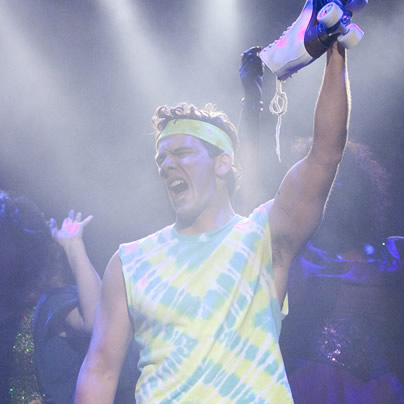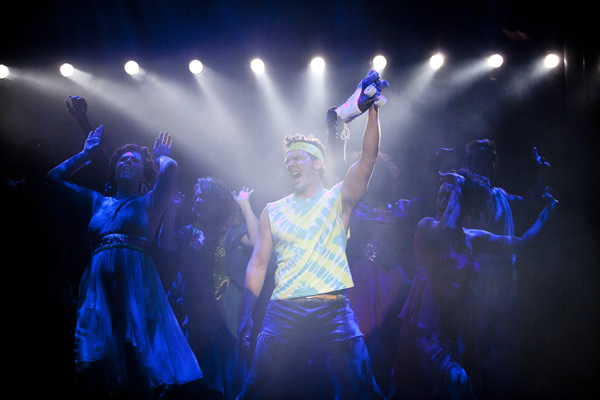Arts & Entertainment
Escapism on skates
Signature’s ‘Xanadu’ is well-executed camp fun

‘Xanadu’
Signature Theatre
4200 Campbell Ave.
Arlington, VA
Through July 1
703-820-9771

Charlie Brady, center, as Sonny in Signature’s ‘Xanadu.’ (Photo by Scott Suchman; courtesy Signature)
The “Xanadu” chracter Muse Calliope is onto something when she says the roller derby in the show is like “children’s theater for 40-year-old gay people.”
On stage now at Arlington’s Signature Theatre, this trashy movie-turned-Tony-winning Broadway adaptation is near-perfect theatrical escapism.
It’s based on the 1980 turkey that derailed the budding movie career of singer Olivia Newton-John and that featured the last movie appearance of the legendary dancer Gene Kelly as the tycoon who has chosen commerce over art. The basic plot remains the same.
Clio (Erin Weaver) is the leader of the Muses, the Greek demigoddesses who bring artistic inspiration to mortals. Disguised an Australian woman named Kira (a comic nod to Newton-John’s indelible cinematic performance), she descends to earth to bolster the confidence of Sonny (Charlie Brady), a sidewalk artist who dreams of opening a roller disco. She also encounters Danny, a real estate mogul who rejected Kira’s inspiration. Danny still owns the theater he built under her influence, and he and Sonny become business partners. Needless to say, despite a few curses, several broken rules, and some heartbreak and confusion, Sonny and Kira/Clio fall in love and skate off to their happy ending.
Writer Douglas Carter Beane (“The Little Dog Laughed” and “To Wong Foo, Thanks for Everything, Julie Newmar”) nimbly fleshes out the movie plot with campy pop culture references and a delicious new subplot featuring the nasty machinations of Clio’s jealous sisters, the muses Melpomene and Calliope. He also expands the movie soundtrack with other period pop tunes by Jeff Lynne (ELO) and John Farrar. As you might expect, the openly gay Beane brings a light touch to the clichéd plot, but he also brings some unexpected emotional depth to the story. Although the evening moves along briskly (90 minutes without an intermission), there are some slow spots (most notably the flashbacks between the ageless Clio and the young Danny) and Beane’s adaptation never fully embraces the movie’s sappy-yet-moving theme that the elusive Xanadu is the pursuit of love and art.
Under the assured hand of director and choreographer Matthew Gardiner, Signature Theatre’s openly gay associate artistic director, the creative team stitches together a frothy and effective show that is truly “an Acme of all the arts” (to use Sonny’s description of his roller disco dreams). Gardiner’s witty and energetic choreography cannily combines a send-up of disco moves for the mortals with a spoof of Martha Graham routines for the Muses and Greek gods.
He gets solid support from his designers, especially the lighting by Chris Lee (with the mandatory mirror balls) and the costumes by Kathleen Geldard (with lovely flowing Grecian robes, the requisite sequins and de rigueur leg warmers that play a surprisingly important role in the plot). They mine the comedy for all it’s worth, hit all of the right notes of the 1980s pop score (kudos to Music Director Gabriel Mangiante and his four-piece band) and put together lovely stage pictures.
Gardiner also gets strong performances from his likeable leads and a versatile ensemble that appear in a variety of roles from Centaurs to Muses to an endless array of back-up singers. Brady and Weaver play the comedy just right, with the proper balance of naiveté and campy self-awareness. Both are strong and attractive singers and dancers who bring unquenchable enthusiasm to the bubbly material.
The show shines most brightly, however, when Nora V. Payton takes center stage as Melpomene, the evil Muse of tragedy. She gets the best material in the script and she delivers with zest and finesse. Payton (who inspired audiences as Motormouth Maybelle in “Hairspray” and will no doubt thrill audiences as Effie in next season’s “Dreamgirls”) lights up the stage with her wicked sense of style, an incredible vocal presence and her gleeful delivery of verbal and physical zingers. She is given great comic and vocal support from her evil henchwoman Calliope (played by Sherri L. Edelen who also shines in a giddy cameo as a Francophile Aphrodite, goddess of love). Their duet of the rock classic “Evil Woman” is a highlight of the evening.
The skating, under the guidance of Gregory Vander Ploeg, is impressively staged and includes the tender duets between Kira and Sonny, Kira’s hilarious descent down on a staircase wearing only one skate, and the rollicking finale which brings the entire cast to the new roller disco.

Team DC, the umbrella organization for LGBTQ-friendly sports teams and leagues in the D.C. area, held its annual Night of Champions Awards Gala on Saturday, April 20 at the Hilton National Mall. The organization gave out scholarships to area LGBTQ student athletes as well as awards to the Different Drummers, Kelly Laczko of Duplex Diner, Stacy Smith of the Edmund Burke School, Bryan Frank of Triout, JC Adams of DCG Basketball and the DC Gay Flag Football League.
(Washington Blade photos by Michael Key)




















The 2024 National Cannabis Festival was held at the Fields at RFK Stadium on April 19-20.
(Washington Blade photos by Michael Key)
















Covering the @NatlCannaFest at RFK Stadium for @WashBlade . Stop by the LGBTQ+ booth and pick up a paper if you are here. pic.twitter.com/is7hnsaPns
— Michael Patrick Key (@MichaelKeyWB) April 20, 2024
Theater
‘Amm(i)gone’ explores family, queerness, and faith
A ‘fully autobiographical’ work from out artist Adil Mansoor

‘Amm(i)gone’
Thorough May 12
Woolly Mammoth Theatre
641 D St., N.W.
$60-$70
Woollymammoth.net
“Fully and utterly autobiographical.” That’s how Adil Mansoor describes “Amm(i)gone,” his one-man work currently playing at Woolly Mammoth Theatre.
Both created and performed by out artist Mansoor, it’s his story about inviting his Pakistani mother to translate Sophocles’s Greek tragedy “Antigone” into Urdu. Throughout the journey, there’s an exploration of family, queerness, and faith,as well as references to teachings from the Quran, and audio conversations with his Muslim mother.
Mansoor, 38, grew up in the suburbs of Chicago and is now based in Pittsburgh where he’s a busy theater maker. He’s also the founding member of Pittsburgh’s Hatch Arts Collective and the former artistic director of Dreams of Hope, an LGBTQ youth arts organization.
WASHINGTON BLADE: What spurred you to create “Amm(i)gone”?
ADIL MANSOOR: I was reading a translation of “Antigone” a few years back and found myself emotionally overwhelmed. A Theban princess buries her brother knowing it will cost her, her own life. It’s about a person for whom all aspirations are in the afterlife. And what does that do to the living when all of your hopes and dreams have to be reserved for the afterlife?
I found grant funding to pay my mom to do the translation. I wanted to engage in learning. I wanted to share theater but especially this ancient tragedy. My mother appreciated the characters were struggling between loving one another and their beliefs.
BLADE: Are you more director than actor?
MANSOOR: I’m primarily a director with an MFA in directing from Carnegie Mellon. I wrote, directed, and performed in this show, and had been working on it for four years. I’ve done different versions including Zoom. Woolly’s is a new production with the same team who’ve been involved since the beginning.
I love solo performance. I’ve produced and now teach solo performance and believe in its power. And I definitely lean toward “performance” and I haven’t “acted” since I was in college. I feel good on stage. I was a tour guide and do a lot of public speaking. I enjoy the attention.
BLADE: Describe your mom.
MANSOOR: My mom is a wonderfully devout Muslim, single mother, social worker who discovered my queerness on Google. And she prays for me.
She and I are similar, the way we look at things, the way we laugh. But different too. And those are among the questions I ask in this show. Our relationship is both beautiful and complicated.
BLADE: So, you weren’t exactly hiding your sexuality?
MANSOOR: In my mid-20s, I took time to talk with friends about our being queer with relation to our careers. My sexuality is essential to the work. As the artistic director at Dreams of Hope, part of the work was to model what it means to be public. If I’m in a room with queer and trans teenagers, part of what I’m doing is modeling queer adulthood. The way they see me in the world is part of what I’m putting out there. And I want that to be expansive and full.
So much of my work involves fundraising and being a face in schools. Being out is about making safe space for queer young folks.
BLADE: Have you encountered much Islamophobia?
MANSOOR: When 9/11 happened, I was a sophomore in high school, so yes. I faced a lot then and now. I’ve been egged on the street in the last four months. I see it in the classroom. It shows up in all sorts of ways.
BLADE: What prompted you to lead your creative life in Pittsburgh?
MANSOOR: I’ve been here for 14 years. I breathe with ease in Pittsburgh. The hills and the valleys and the rust of the city do something to me. It’s beautiful, it’ affordable, and there is support for local artists. There’s a lot of opportunity.
Still, the plan was to move to New York in September of 2020 but that was cancelled. Then the pandemic showed me that I could live in Pittsburgh and still have a nationally viable career.
BLADE: What are you trying to achieve with “Amm(i)gone”?
MANSOOR: What I’m sharing in the show is so very specific but I hear people from other backgrounds say I totally see my mom in that. My partner is Catholic and we share so much in relation to this.
I hope the work is embracing the fullness of queerness and how means so many things. And I hope the show makes audiences want to call their parents or squeeze their partners.
-

 South America4 days ago
South America4 days agoDaniel Zamudio murderer’s parole request denied
-

 Maryland5 days ago
Maryland5 days agoMontgomery County police chief discusses arrest of trans student charged with planned school shooting
-

 Commentary5 days ago
Commentary5 days agoWorld ‘isn’t much different today’
-

 State Department20 hours ago
State Department20 hours agoState Department releases annual human rights report











